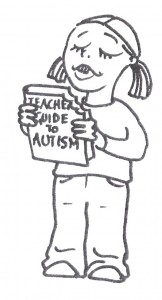- All children live up (or down) to other people’s expectations so be positive and realistic – as your attitude will affect much of the rest of his life.
- Your job is to help him to fulfil his potential.
- Children with ASD are often more vulnerable to bulling than other children – and, because some of them may be socially naïve they can sometimes be manipulated by their peers.
- The majority of children with ASD have a range of sensory differences that can make their lives very challenging. This can give rise to problem in several areas so that he may:
- only hear parts of a sentence.
- have hyperacusis and actually find some sounds painful – or hear things that you don’t like the fan on an interactive white board.
- find physical touch painful – so don’t touch him unless he can see that you are going to – or you tell him that you are going to.
- be extremely sensitive to some smells and tastes.
- have undiagnosed visual differences.
Such problems can:
- affect reading/writing – so do make allowances for his difficulties and don’t expect the impossible like coloring within lines, writing neatly or reading out loud.
- make some patterns on clothing (like stripes) uncomfortable for him to look at.
- make walking down a corridor difficult.
- give him fragmented vision or even make him face-blind under some lighting conditions – much as it does when you walk into a room after being outside in bright sunlight.
- make eye contact painful.
Those problems can:
- Make him incredibly anxious
- Leave him unable to process more than one piece of info at a time – so don’t expect – or force the child to make eye contact as that may make it hard for him to concentrate on what you are saying.
- Mean that in some situations – like a noisy room – he will be vulnerable to ‘overload.’ That can cause him to, make mistakes, get frustrated or have a melt-down or even fall asleep. If you allow him to take a break – preferably before he gets overloaded – he will be able to return re-focused.
- If he is already in overload, try not to touch or talk to him unless you have to as that can add to the stress.
Don’t take things personally. Sometimes problems arise because:
- He takes things literally – and will often not understand jokes, sarcasm etc.
- His sense of personal space is poor so he may impinge on others.
- He speaks his mind – and even though he doesn’t mean to be impolite it can sometimes sound that way.
- Some (though not all) children have a severe form of social anxiety which can also impair their ability to communicate and interact with others.
Always try to preempt problems before they arise.
NB Some children actually act out the feelings of those around them – so stay calm. If you feel that you are getting overwhelmed step away and take the time to calm down or take a break.
If you would like a free book with more information see www.autismdecoded.com



